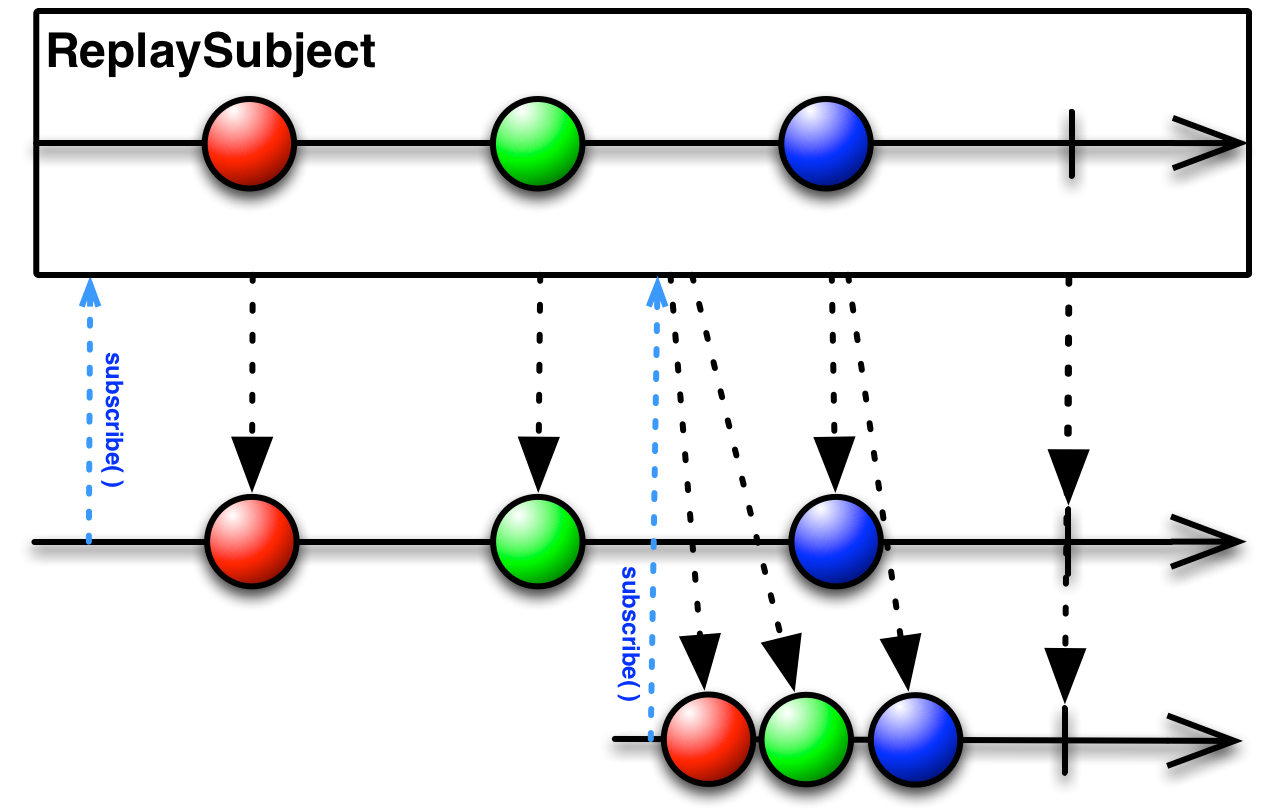
rx.subjects.ReplaySubject Maven / Gradle / Ivy
Go to download
Show more of this group Show more artifacts with this name
Show all versions of rxjava-core Show documentation
Show all versions of rxjava-core Show documentation
rxjava-core developed by Netflix
/**
* Copyright 2014 Netflix, Inc.
*
* Licensed under the Apache License, Version 2.0 (the "License");
* you may not use this file except in compliance with the License.
* You may obtain a copy of the License at
*
* http://www.apache.org/licenses/LICENSE-2.0
*
* Unless required by applicable law or agreed to in writing, software
* distributed under the License is distributed on an "AS IS" BASIS,
* WITHOUT WARRANTIES OR CONDITIONS OF ANY KIND, either express or implied.
* See the License for the specific language governing permissions and
* limitations under the License.
*/
package rx.subjects;
import java.util.ArrayList;
import java.util.Collection;
import java.util.concurrent.ConcurrentHashMap;
import java.util.concurrent.atomic.AtomicInteger;
import java.util.concurrent.atomic.AtomicReference;
import rx.Notification;
import rx.Observer;
import rx.functions.Action1;
import rx.subjects.SubjectSubscriptionManager.SubjectObserver;
/**
* Subject that retains all events and will replay them to an {@link Observer} that subscribes.
*
*  *
*
* Example usage:
*
*
{@code
* ReplaySubject
*
* @param
*/
public final class ReplaySubject extends Subject {
public static ReplaySubject create() {
return create(16);
}
public static ReplaySubject create(int initialCapacity) {
final SubjectSubscriptionManager subscriptionManager = new SubjectSubscriptionManager();
final ReplayState state = new ReplayState(initialCapacity);
OnSubscribe onSubscribe = subscriptionManager.getOnSubscribeFunc(
/**
* This function executes at beginning of subscription.
* We want to replay history with the subscribing thread
* before the Observer gets registered.
*
* This will always run, even if Subject is in terminal state.
*/
new Action1>() {
@Override
public void call(SubjectObserver o) {
// replay history for this observer using the subscribing thread
int lastIndex = replayObserverFromIndex(state.history, 0, o);
// now that it is caught up add to observers
state.replayState.put(o, lastIndex);
}
},
/**
* This function executes if the Subject is terminated.
*/
new Action1>() {
@Override
public void call(SubjectObserver o) {
Integer idx = state.replayState.remove(o);
// we will finish replaying if there is anything left
replayObserverFromIndex(state.history, idx, o);
}
},
new Action1>() {
@Override
public void call(SubjectObserver o) {
state.replayState.remove(o);
}
});
return new ReplaySubject(onSubscribe, subscriptionManager, state);
}
private static class ReplayState {
// single-producer, multi-consumer
final History history;
// each Observer is tracked here for what events they have received
final ConcurrentHashMap, Integer> replayState;
public ReplayState(int initialCapacity) {
history = new History(initialCapacity);
replayState = new ConcurrentHashMap, Integer>();
}
}
private final SubjectSubscriptionManager subscriptionManager;
private final ReplayState state;
protected ReplaySubject(OnSubscribe onSubscribe, SubjectSubscriptionManager subscriptionManager, ReplayState state) {
super(onSubscribe);
this.subscriptionManager = subscriptionManager;
this.state = state;
}
@Override
public void onCompleted() {
subscriptionManager.terminate(new Action1>>() {
@Override
public void call(Collection> observers) {
state.history.complete(Notification.createOnCompleted());
for (SubjectObserver o : observers) {
if (caughtUp(o)) {
o.onCompleted();
}
}
}
});
}
@Override
public void onError(final Throwable e) {
subscriptionManager.terminate(new Action1>>() {
@Override
public void call(Collection> observers) {
state.history.complete(Notification.createOnError(e));
for (SubjectObserver o : observers) {
if (caughtUp(o)) {
o.onError(e);
}
}
}
});
}
@Override
public void onNext(T v) {
if (state.history.terminalValue.get() != null) {
return;
}
state.history.next(v);
for (SubjectObserver o : subscriptionManager.rawSnapshot()) {
if (caughtUp(o)) {
o.onNext(v);
}
}
}
/*
* This is not very elegant but resulted in non-trivial performance improvement by
* eliminating the 'replay' code-path on the normal fast-path of emitting values.
*
* With this method: 16,151,174 ops/sec
* Without: 8,632,358 ops/sec
*/
private boolean caughtUp(SubjectObserver o) {
if (!o.caughtUp) {
o.caughtUp = true;
replayObserver(o);
return false;
} else {
// it was caught up so proceed the "raw route"
return true;
}
}
private void replayObserver(SubjectObserver observer) {
Integer lastEmittedLink = state.replayState.get(observer);
if (lastEmittedLink != null) {
int l = replayObserverFromIndex(state.history, lastEmittedLink, observer);
state.replayState.put(observer, l);
} else {
throw new IllegalStateException("failed to find lastEmittedLink for: " + observer);
}
}
private static int replayObserverFromIndex(History history, Integer l, SubjectObserver observer) {
while (l < history.index.get()) {
observer.onNext(history.list.get(l));
l++;
}
if (history.terminalValue.get() != null) {
history.terminalValue.get().accept(observer);
}
return l;
}
/**
* NOT thread-safe for multi-writer. Assumes single-writer.
* Is thread-safe for multi-reader.
*
* @param
*/
private static class History {
private final AtomicInteger index;
private final ArrayList list;
private final AtomicReference> terminalValue;
public History(int initialCapacity) {
index = new AtomicInteger(0);
list = new ArrayList(initialCapacity);
terminalValue = new AtomicReference>();
}
public boolean next(T n) {
if (terminalValue.get() == null) {
list.add(n);
index.getAndIncrement();
return true;
} else {
return false;
}
}
public void complete(Notification n) {
terminalValue.set(n);
}
}
/**
* @return Returns the number of subscribers.
*/
/* Support test.*/ int subscriberCount() {
return state.replayState.size();
}
} © 2015 - 2024 Weber Informatics LLC | Privacy Policy